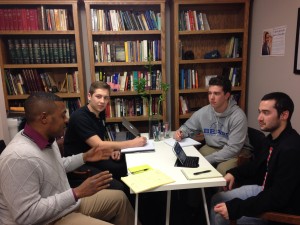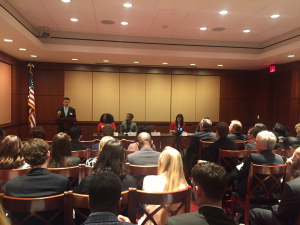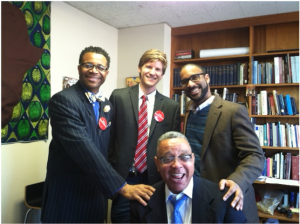This sermon was given by Jesse Winter at Washington City Church of the Brethren on November 15, 2015. The scripture for the service was Matthew 23:23-36.
When I was asked to preach today, Nate wanted me to talk about mass incarceration. Criminal justice reform is a major focus of my work in the Office of Public Witness, and over the past few months I have learned how complex that issue is. It involves everything from politics, money, and race to power, privilege, and fear. But even though this issue is important and needs to be discussed, as I read through my sermon last night, my words felt hollow. Given the recent events in Paris, I felt called to table that discussion for another day to talk about the equally complex and important issue of religious violence around the world. With Paris weighing on the hearts of people everywhere, this conversation is necessary and prudent – even if it means rewriting a sermon late into the night.
The support for those suffering in Paris on the news and in social media has been tremendous. At least so far, the outpouring of love and support has overshadowed any bigotry and fear mongering, of which I have seen very little. This response is heartening. The human spirit comes to fruition in community, and the people of the world – even those with their noses stuck in an iPhone – have banded together to kindle the fires of hope and comfort. I was shocked on Friday when I watched the news, hearing about shootings and hostage situations turning into mass killings. Eventually had to go away and distract myself. Technology has made this conflict real for us.
But as we mourn those in Paris with the rest of the world, we have to remember that such events are just a small part of a global equation that includes all those issues – politics, money, race, class, power, and fear. Paris is just a part of a bigger issue. The rise of religious violence around the world is fast becoming the hallmark of the 21st century.
I went to a talk at the Brookings Institution earlier this week that could not be timelier. Jonathan Sacks, former Chief Rabbi of the United Hebrew Congregations of the Commonwealth, philosopher, scholar, and recipient of over 16 honorary degrees, spoke about the his new book, Not in God’s Name: Confronting Religious Violence. Sacks argues that the secularization of western culture has created a West that lacks the mindset and language necessary to tackle an increasingly radically religious world. He argues that the growth of radical groups like the Islamic State is more than just a response to Western decadence. It is a battle of ideas that goes to the core of the three Abrahamic faiths: Islam, Judaism, and Christianity. Like Cain and Abel, the three faiths are locked in a sibling rivalry for the favor of their Abrahamic Parent, a fight that we all know ends in death. Religious radicalization and subsequent religious violence is about identity. The three faiths share many similarities, but they each are distinct, and it is that unique identity which can lead to zealotry and violence. The harder you hold on to an egg, the more likely you will have a mess.
This picture may be correct, but even more important is Sacks’ proposed response to this picture. While preserving identity is important, – crucial, in fact – religious, social, and cultural identities cannot overshadow a fundamental human identity. We are all children of God. On that scale, other differences are superficial. Our disproportional attention to Paris, if we are honest, comes out of our shared identities as wealthy, majority white, western nations. Our response, however, needs foresight and breadth that allows us to see the strings that tie those in Paris, to those in Syria, to those in Nigeria, to those in China, Romania, Nicaragua, Russia, Texas, Washington, DC.
One of the many posts I found on Facebook about Paris comes from my friend Mark. Mark has been a friend and mentor since my first year at Bridgewater College, and though he graduated that year, his thoughtfulness and wisdom are two qualities that have sustained our friendship over the years. Here is what Mark has to say:
“On November 1st, a terrorist group named Al-Shabaab killed 12 in Mogadishu, Somalia. A suicide bomber killed 5 in Lebanon on November 5th. An expected ISIS-related bombing killed 12 in Baghdad, Iraq (injuring 15) on November 7th. Boko Haram kills 3 in a suicide bombing in Chad on November 9th. In Cameroon, November 9th, a 14 year old girl acted as a suicide bomber killing 4 persons. 43 die and 240 are injured on November 12th by ISIL suicide bombers in Beirut, Lebanon. In Baghdad, Iraq, again, on November 13th, 19 are injured and 33 are killed by ISIS.
Last month, ISIL killed 244 people in Sinai, Egypt on October 31st. Bombings killed 27 and injured 96 on November 23rd in Yola, Nigeria and on October 14th, 42 were killed by suicide bombers in Maiduguri, Nigeria. On October 10th, Boko Haram kills 38 in Chad. 102 die and 508 are injured due to suicide bombings in Ankara, Turkey due to ISIL. Car bombings kill 57 in Baghdad, Iraq on October 5th due to the Islamic State. In Abuja, Nigeria, Boko Haram kills 18 on October 2nd.
I could keep going and mention the 145 that died and 150 that were injured in Maiduguri, Nigeria on September 20th due to Boko Haram, and so forth and so forth.
And yesterday, 129 (so far) people died in Paris, France. I have changed my profile picture, read the news about these attacks diligently, found relief that Facebook notifies that people are marked safe by these attacks, gotten into lengthy discussions on how to solve this problem, etc.
And yet. I have done absolutely none of that when persons died in Turkey, Nigeria, Iraq, Cameroon, Chad, Egypt, Syria, etc. Why not? That might be the most important question to come out of this whole thing.
Peace and hope to the people in France, Iraq, Turkey, Egypt, Chad, Nigeria, Syria, Cameroon, and the countless other places that live in constant terror.”
Our eyes glaze over at such numbers. We are conditioned to not pay attention. Mark’s question is right. Why, only now, are we really paying attention? Racism, xenophobia, and lack of a shared identity inhibit our ability to connect with those outside of the American suburbs. Again this is an unfortunate side effect of our conditioning and media bias and blah blah blah – but we have to own it. Jesus rails on the Pharisees for being hypocrites. While I don’t accuse anybody here as individuals, our nation as a whole is blind. We need to recognize our blindness, and even more, we need to make sure that Paris – in all of its horror, spectacle, and sadness – becomes the mud Jesus spat in to give us new sight. While it may have taken a bomb in a Paris coffee shop to unite the world, we need to remember the drowned Syrian boy who washed up on the Mediterranean, the Chibok girls taken hostage in Nigeria, those dead in a Yemini hospital. We need to remember a world with seemingly too many wounds to heal.
The Church of the Brethren has been faithful in its commitment to peace and stability in many of those forgotten places – especially Nigeria. The Church should be proud of its work, but we need to know there are still many places left untouched by a helpful hand.
The last part of the scripture is about humility. The Pharisees laud the heroes of the past and distance themselves from those who murdered the prophets. Jesus bursts that prideful bubble and tells them to own both the failures and successes of their ancestors.
Paris, too, I think has broken the West’s pride. There is a sense that the West is insulated from the problems of the rest of the world. The wars we fight are overseas – not at home. The events in Paris show that the bubble is broken. We stagger in disbelief: “This doesn’t happen here!” Our pride is our ignorance, and we need to admit that, through a series of unfortunate events, we played a role in this tragedy. As we move forward, we need to do so with humility. A recent international poll says that the US – not Russia, Iran, or North Korea – is the greatest threat to world peace. Even when acting with good intentions, this country has been both a direct and indirect cause of suffering in the world. How we move forward matters.
We also need to watch where we go after the initial shock of Paris goes away. Paris is fast becoming a symbol, and while support rains down now, where will that energy go? Will we be a shield that protects human dignity, or a sword that severs people from it? If we take the second option, are we forfeiting our own humanity? Jesus tells the Pharisees they have ignored the higher duties of justice, mercy, and faith. He told us to love our enemies. In a time where the world is so emotionally invested, I think the greatest challenge will be forestalling the call to vengeance, tempering our justice with mercy, walking forward in faith, loving our enemies. Our world needs this more than ever.
I don’t offer any concrete course of action, 1) because I don’t have a clue where to begin and 2) because I don’t think it is time. Emotions are high. Action is important, but any step forward needs to be done with a level head. In these troubling times, the world needs to hear our prayers for peace. Jesus’ story promises redemption. May we redeem this world by remembering our kinship to all persons, especially those who commit violence out of hate. May we climb this mountain with humility, sending our loving voices down through the valley. May we take to heart the words of a true disciple: “Darkness cannot drive out darkness; only light can do that. Hate cannot drive out hate; only love can do that.” All this falls upon our generation.
Benediction: God, we come to you in the need of prayer. We ache and mourn for those in Paris. We hear their cries. But we know their cries are but an echo, for all over, fear and terror and violence rule the lives of so many. God, send your love to the people of this world. May it heal those who hurt and transform those who hate. Be there in the midst of suffering. Be there with policy makers as they discern the fates of nations. Be here with us as we struggle to find our place amid madness. We pray for peace and we pray for your light in the weeks ahead. Amen.




